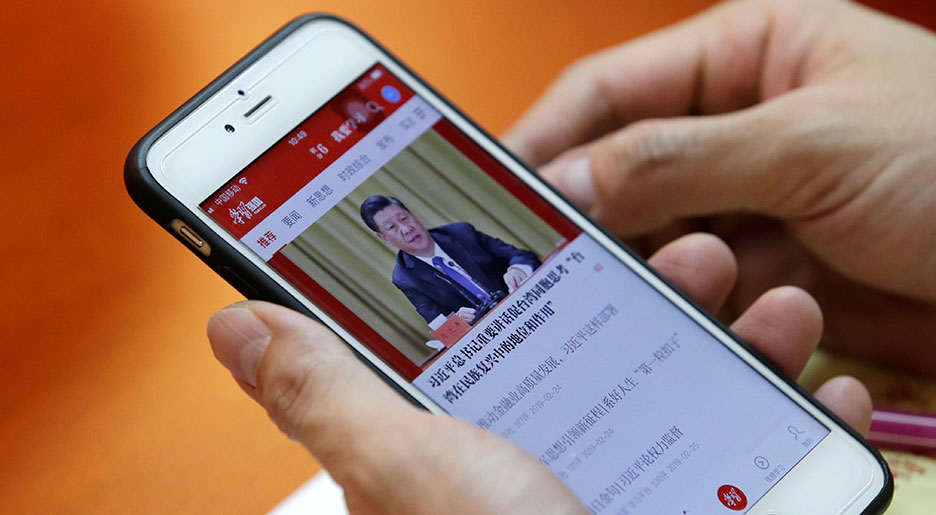China tightens control of media through app

The Chinese Communist Party (CCP), under President Xi Jinping, continues to increase its stringent control and censorship of the media and the internet. In August 2019, the CCP’s Media Oversight Office of the Central Propaganda Department said that all members of the media in China must be trained and tested through an app that Xi introduced in January 2019 to control tens of millions of Chinese citizens, including government employees and schoolteachers, according to David Bandurski, co-director of the China Media Project, an independent research program at the University of Hong Kong.
The “Study Xi, Great Nation” app forces users to study CCP propaganda and materials or be penalized with loss of pay or other punishments, various news agencies reported. All news personnel in China must now pass a test to be administered by the app in October 2019 to receive their press passes, according to Bandurski, who also edits the China Media Project website.
The CCP media office also mandated that all party media organizations, including state-run newspapers, websites, television and radio networks, launch study groups by mid-September through the app, which was created by the CCP and the state-controlled company Alibaba, Bandurski reported.
State media claim the app, which is the most downloaded app in China for Apple devices, has more than 100 million users, The Independent, an online British newspaper, reported.
The app “can place extraordinary demands on personal time, putting users under significant pressure to maintain point-earning, or fall behind at their own peril,” Bandurski wrote.
The app scores users on a point system and monitors their progress in learning propaganda and following Xi and party news. Some Chinese employers require employees to submit screenshots daily to document their progress, The Independent reported.
“You cannot divert attention away from it,” Dr. Haiqing Yu, a professor at RMIT University in Australia who studies Chinese media, told The New York Timesnewspaper in April 2019 of the app. “It’s a kind of digital surveillance. It brings the digital dictatorship to a new level.”
Xi “is using new media to fortify loyalty toward him,” Wu Qiang, a Beijing-based political analyst, explained to The New York Timesin April 2019. He likened the “Study Xi, Great Nation” app (which can also be translated as the “Study the Great Nation” or “Study to Make China Strong” app) to the “little red book” of Mao propaganda disseminated by the CCP during the Cultural Revolution in the 1960s and 1970s. (Pictured: A Chinese Communist Party member uses his mobile phone to participate in a study group on the app in February 2019).
Manyanalysts consider Xi’s latest app an extension of the recently introduced “social credit” scoring system that uses an individual’s data to grant or deny certain privileges that range from getting into a good school to buying a plane ticket to leaving the country.
Like Mao, Xi has openly stated his desire to control the media.
In December 2013, Xi and the CCP started requiring Chinese journalists to pass a test on party ideology to be credentialed, according to Reuters. The test was based on a 700-page manual that included such directives as “it is absolutely not permitted for published reports to feature any comments that go against the party line,” and “the relationship between the party and the news media is one of leader and the led,” Reuters reported. At the time, the CCP required journalists to do a minimum of 18 hours of training on topics such as Marxist news values and socialism with Chinese characteristics.
“The purpose of this kind of control is just to wear you down, to make you feel like political control is inescapable,” a newspaper reporter in Guangzhou told Reuters when the test was first implemented.
Xi’spolicies have relegated the media into “a group of servants. They are not journalists anymore. They are the party’s mouthpiece. They wait on the party,” Zhang Lifan, a Beijing historian, told The Guardian newspaper in 2016. In recent years, Xi has only ramped up media controls, imprisoning more than 60 journalists and bloggers in 2019, for example, in conditions that threaten their lives, according to the Reporters Without Borders website.
Zhang and other analysts said that Xi’s battle to achieve media supremacy is all about seizing absolute control of the Chinese state to counter an increasingly disbelieving public and political challenges from within the party.
Xi’s attempts at media control are “all part of a trend towards a much harder or harsher authoritarianism in China,” Bill Bishop, an observer of Chinese politics, told The Guardian.
“Because, ultimately, his goal is for China to have a much more highly functioning authoritarian, single-party state. But to get there it is not going to be a soft authoritarianism — it is going to be a hard authoritarianism,” said Bishop, who edits Sinocism, a respected China-focused email newsletter.




